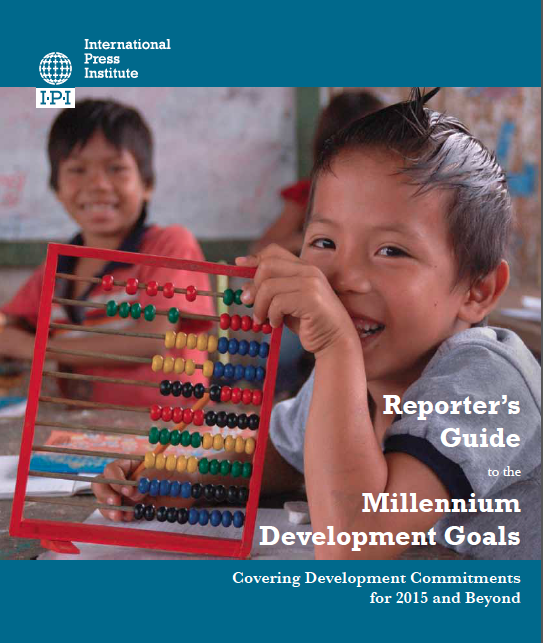

On the Trail: How To Request Information from Authorities
 Part 13 of a series GIJN is excerpting from the Reporter’s Guide to the Millennium Development Goals: Covering Development Commitments for 2015 and Beyond, published by the International Press Institute.
Part 13 of a series GIJN is excerpting from the Reporter’s Guide to the Millennium Development Goals: Covering Development Commitments for 2015 and Beyond, published by the International Press Institute.

unsealed in 2012, related to alleged crimes committed during the dictatorship of Alfredo Stroessner. EFE/Andrés Cristaldo.
Power sets barriers and the reporter pushes back against them—it’s an unwritten rule on which Colombian writer Gabriel García Márquez believed all journalistic work is based. Some governments, however, have begun to voluntarily lower these barriers by approving legislation designed to make information more accessible to their citizens.
To date, approximately 90 countries have freedom of information laws, which establish rules and deadlines for facilitating the collection of data. Even in (democratic) countries where no such specific statute exists, it is assumed that public access to information is guaranteed by the right to freedom of expression. Even in these countries, though, such laws certainly cannot guarantee transparency. In the first place, most people, including reporters, are unaware that they have the right to access information generated by their governments.
What follows are some suggestions and tips that can facilitate journalists’ work in requesting information from authorities, even in those countries where there is no specific law regulating the issue. If reporters gain access to accurate data, their stories will be of a higher quality and citizens will be better informed when making decisions involving the future of their societies.
Some Key Points
Where Is the Information?
The first task of journalists looking for information must be to identify which state institutions have the information they need. Often, diverse government offices possess the same information, and, in the case of countries that do not have a specific legislation regulating the issue, these offices can also regulate the access to that information. Importantly, reporters should consider, from the start, that the information they are looking for might not only be hidden in the desks of senior government officials, but also already available in public databases. Sometimes, they might also find the desired data in less bureaucratic locations, such as private institutions, regional offices of the major ministries, and so on.
Is the Information “Secret”?
Before making a formal application, journalists must make sure that the information required has not been classified as a state secret by the constitution or any other national law, or exempted by any other standard. All information that affects national security or involves financial or commercial secrets, criminal investigations (summary trials), or the private lives of ordinary citizens who do not occupy bureaucratic positions, is often restricted. Everything else is public: official statistics, the execution of budgets, and procurements of the companies who have a contract with the state, for example. Anything that is public—although it sounds obvious to say—should never be a secret.
Less Is More
The more accurate the information request is, the more likely it is that journalists will get an answer that meets their expectations. Each application must be written in a simple way, identifying the data required as clearly as possible. It is very important to define the parameters: if journalists are interested in obtaining information for a specific time period, they must indicate it on the order. Also note how the information should be expressed: as annual or monthly reports, for example.
One Question at a Time
When requesting information, journalists should ask one question at a time, thus requiring only one response from the public administration. It is better to make several requests for information, rather than taking the risk of writing a long list of questions that will end up unanswered.
Polite but Strong
It is always advisable to invoke the law when making a request for information. When writing an application, mention the standards that guarantee the exercise of this right in each country, and the specific articles of the constitution or the laws on access to information, for example, depending on the case. In those states where a specific law to guarantee access to information has not been approved, appeal to some articles of international human-rights documents, including the Universal Declaration of Human Rights (Article 19), and the International Covenant on Civil and Political Rights (also Article 19)—or in the case of the American continent, the American Declaration of the Rights and Duties of Man (Article IV), the American Convention on Human Rights (Article 13), and the Inter-American Convention against Corruption (complete text).
In democratic states, public officials, regardless of their rank, are duty-bound to provide timely and accurate information to citizens. However, as some officials may forget this fact, journalists—in respectful but firm language—should remind them as part of each information request.
Proof of the Request
It is essential when they make the request for information that journalists obtain a signed and sealed copy of it from the public body or authority, to prove that the request was both made and received. It is also important to be in permanent contact with the officer who will answer the petition, to track the status of the request and clarify any doubt that may arise about specific data or required documentation.
Persist, Always Persist
Journalists must be persistent. If the first inquiry is not answered or the answer is incomplete or ambiguous, submit a second petition. If journalists make mistakes in the first application (lack of clarity about the information requested, for example), they should correct them. In cases where a second request is needed, the journalists’ tone should be even stronger to emphasize the legal obligation of all public officials in democratic states to provide information to citizens.
Silence Is Also News
Even when the laws and international treaties obligate public officials to report accurate and timely information, it is common that requests for information are not answered. Or, if they are, they do not meet journalists’ expectations because the information is incomplete or unclear. This is particularly common in states where there is no system to facilitate access to public information. But in many cases, the lack of response is a deliberate government policy to deny the right to be informed. In that case, administrative silence can also become a story: a reporter can, for example, prepare a report based on the number of information requests that have not been answered and denounce the lack of transparency on a particular topic.
Maye Primera works as the Caracas correspondent for the Spanish newspaper El País and Argentina’s Clarín. She has worked as a political reporter for various Venezuelan publications, including El Globo and El Mundo, and collaborated with the newspapers El Tiempo and El Espectador in Colombia, the Venezuelan newspaper El Nacional, and various magazines. She is author of The Biography of Diógenes Escalante, a book of interviews called The Deluded Republic, and the extended report “Faces and Voices against Impunity.”
Excerpted from Reporter’s Guide to the Millennium Development Goals: Covering Development Commitments for 2015 and Beyond. Agreed to in 2000, the UN Millennium Goals comprise an ambitious agenda to improve quality of life around the world, focusing on such issues as poverty, gender equality, and education. This unique manual, available in four languages, offers journalists practical tips on covering these critical areas as we near the 15th anniversary of the goals. Twenty-one journalists across six continents contributed to the report, including several active in GIJN. We are grateful to the publisher, the International Press Institute, for permission to publish the series, and to the European Press Photo Agency and EFE Agency for permission to publish the accompanying photos.










